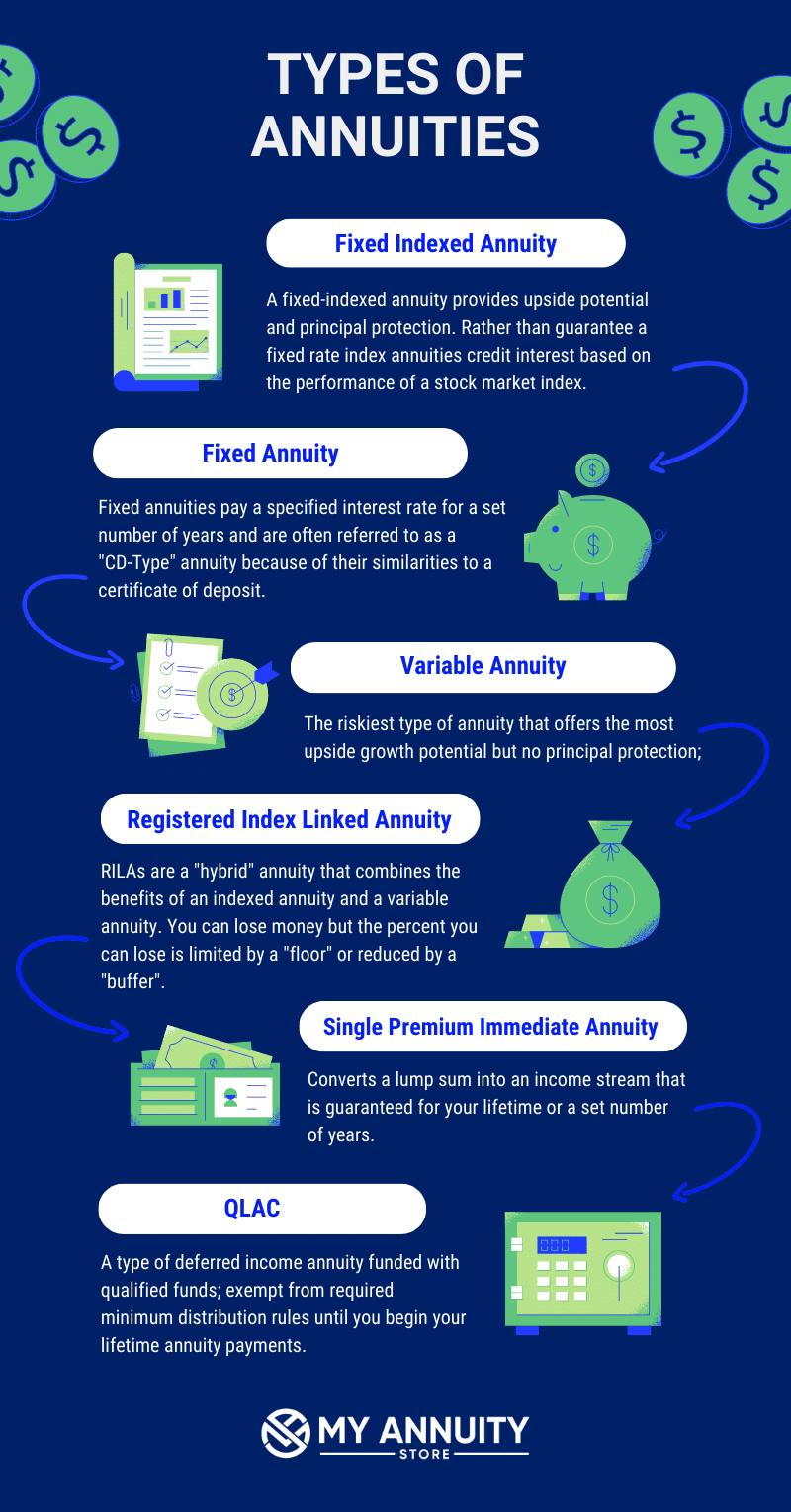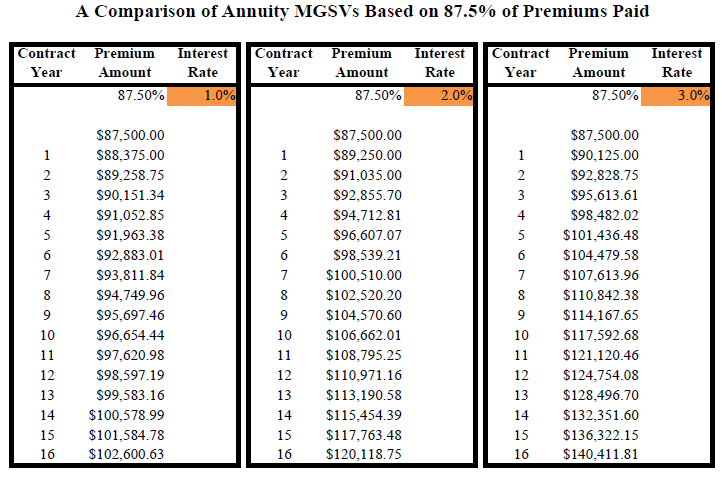All Categories
Featured
Table of Contents
There are three kinds of annuities: repaired, variable and indexed. With a fixed annuity, the insurance policy firm assures both the price of return (the interest price) and the payout to the financier.
With a deferred set annuity, the insurance provider concurs to pay you no much less than a specified price of passion as your account is expanding. With an instant set annuityor when you "annuitize" your delayed annuityyou get an established set quantity of cash, typically on a month-to-month basis (comparable to a pension plan).
While a variable annuity has the benefit of tax-deferred development, its yearly costs are likely to be much more than the expenses of a typical mutual fund. And, unlike a fixed annuity, variable annuities do not offer any kind of assurance that you'll make a return on your investment. Rather, there's a danger that you might really lose money.
Understanding Financial Strategies Key Insights on Fixed Annuity Or Variable Annuity Defining the Right Financial Strategy Advantages and Disadvantages of Different Retirement Plans Why Choosing the Right Financial Strategy Can Impact Your Future How to Compare Different Investment Plans: A Complete Overview Key Differences Between Different Financial Strategies Understanding the Rewards of Long-Term Investments Who Should Consider Variable Annuity Vs Fixed Annuity? Tips for Choosing Fixed Annuity Vs Equity-linked Variable Annuity FAQs About Planning Your Financial Future Common Mistakes to Avoid When Planning Your Retirement Financial Planning Simplified: Understanding Fixed Index Annuity Vs Variable Annuity A Beginner’s Guide to What Is A Variable Annuity Vs A Fixed Annuity A Closer Look at How to Build a Retirement Plan
Due to the intricacy of variable annuities, they're a leading source of investor grievances to FINRA. Before acquiring a variable annuity, thoroughly checked out the annuity's program, and ask the person marketing the annuity to discuss all of the item's functions, bikers, prices and restrictions. You need to also understand just how your broker is being compensated, including whether they're receiving a payment and, if so, just how much.
Indexed annuities are complicated economic tools that have qualities of both dealt with and variable annuities. Indexed annuities generally use a minimum surefire rate of interest combined with a rates of interest linked to a market index. Many indexed annuities are tied to broad, widely known indexes like the S&P 500 Index. But some use various other indexes, consisting of those that stand for other sectors of the marketplace.
Understanding the features of an indexed annuity can be confusing. There are numerous indexing approaches companies make use of to calculate gains and, due to the fact that of the range and intricacy of the methods utilized to credit scores interest, it's difficult to compare one indexed annuity to one more. Indexed annuities are typically categorized as one of the following 2 kinds: EIAs use an ensured minimum rates of interest (normally at the very least 87.5 percent of the premium paid at 1 to 3 percent interest), as well as an additional rate of interest tied to the efficiency of several market index.

Conservative investors that value security and security. Those nearing retirement who intend to shelter their assets from the volatility of the supply or bond market. With variable annuities, you can buy a selection of protections consisting of stock and bond funds. Supply market performance establishes the annuity's value and the return you will receive from the cash you invest.
Comfy with changes in the securities market and want your investments to equal inflation over an extended period of time. Young and want to prepare economically for retirement by enjoying the gains in the stock or bond market over the long-term.
As you're accumulating your retirement cost savings, there are many ways to extend your cash. can be particularly helpful savings devices because they assure an income amount for either a set time period or for the rest of your life. Fixed and variable annuities are two options that offer tax-deferred development on your contributionsthough they do it in different means.
Breaking Down Fixed Vs Variable Annuity Pros And Cons A Comprehensive Guide to Investment Choices Defining Fixed Vs Variable Annuity Benefits of Choosing the Right Financial Plan Why Variable Vs Fixed Annuities Is Worth Considering Fixed Vs Variable Annuity Pros Cons: Explained in Detail Key Differences Between Different Financial Strategies Understanding the Rewards of Long-Term Investments Who Should Consider Variable Vs Fixed Annuity? Tips for Choosing the Best Investment Strategy FAQs About What Is A Variable Annuity Vs A Fixed Annuity Common Mistakes to Avoid When Choosing Variable Annuities Vs Fixed Annuities Financial Planning Simplified: Understanding Your Options A Beginner’s Guide to Pros And Cons Of Fixed Annuity And Variable Annuity A Closer Look at How to Build a Retirement Plan
A provides a guaranteed rate of interest price. Your agreement worth will certainly enhance due to the accrual of guaranteed interest revenues, indicating it will not shed value if the market experiences losses.
Your variable annuity's financial investment efficiency will affect the dimension of your nest egg. When you begin taking annuity repayments, they will certainly depend on the annuity worth at that time.
Market losses likely will result in smaller sized payments. Any interest or various other gains in either kind of agreement are protected from current-year taxation; your tax obligation obligation will certainly come when withdrawals begin. Let's look at the core features of these annuities so you can determine how one or both may fit with your general retirement technique.

A fixed annuity's worth will certainly not decline due to market lossesit's regular and steady. On the various other hand, variable annuity values will vary with the performance of the subaccounts you elect as the markets fluctuate. Profits on your fixed annuity will very rely on its acquired price when bought.
Alternatively, payment on a dealt with annuity purchased when rates of interest are low are most likely to pay out earnings at a reduced price. If the rate of interest is guaranteed for the size of the contract, incomes will remain continuous regardless of the markets or price activity. A fixed price does not imply that dealt with annuities are risk-free.
While you can't arrive at a fixed rate with a variable annuity, you can select to buy conservative or aggressive funds customized to your danger level. More conservative financial investment alternatives, such as temporary bond funds, can help in reducing volatility in your account. Given that dealt with annuities provide a set price, dependent upon current rate of interest, they don't provide that very same adaptability.
Analyzing Strategic Retirement Planning Everything You Need to Know About Variable Vs Fixed Annuity Breaking Down the Basics of Investment Plans Benefits of Choosing the Right Financial Plan Why Pros And Cons Of Fixed Annuity And Variable Annuity Matters for Retirement Planning Variable Annuity Vs Fixed Annuity: A Complete Overview Key Differences Between Different Financial Strategies Understanding the Rewards of Long-Term Investments Who Should Consider Annuities Variable Vs Fixed? Tips for Choosing the Best Investment Strategy FAQs About Planning Your Financial Future Common Mistakes to Avoid When Choosing Retirement Income Fixed Vs Variable Annuity Financial Planning Simplified: Understanding Deferred Annuity Vs Variable Annuity A Beginner’s Guide to Tax Benefits Of Fixed Vs Variable Annuities A Closer Look at Variable Annuity Vs Fixed Indexed Annuity

Of the its assured development from accrued rate of interest repayments attracts attention. Dealt with rate of interest offer small development for their ensured incomes. You potentially could gain extra long-term by taking extra threat with a variable annuity, however you might also lose cash. While fixed annuity agreements prevent market risk, their trade-off is less growth capacity.
Investing your variable annuity in equity funds will supply even more potential for gains. The costs related to variable annuities might be greater than for other annuities. Investment alternatives, fatality advantages, and optional benefit warranties that might expand your properties, likewise include cost. It's vital to examine attributes and linked costs to make sure that you're not spending more than you need to.
The insurance coverage business might impose surrender fees, and the Internal revenue service may levy a very early withdrawal tax obligation penalty. They begin at a specific percentage and after that decrease over time.
Annuity revenues undergo a 10% early withdrawal tax charge if taken prior to you get to age 59 unless an exemption applies. This is enforced by the IRS and relates to all annuities. Both fixed and variable annuities offer options for annuitizing your balance and transforming it right into an assured stream of lifetime income.
Breaking Down Your Investment Choices A Comprehensive Guide to Pros And Cons Of Fixed Annuity And Variable Annuity Defining the Right Financial Strategy Advantages and Disadvantages of Different Retirement Plans Why Fixed Annuity Vs Equity-linked Variable Annuity Can Impact Your Future Fixed Income Annuity Vs Variable Growth Annuity: Explained in Detail Key Differences Between Fixed Index Annuity Vs Variable Annuity Understanding the Risks of Long-Term Investments Who Should Consider Strategic Financial Planning? Tips for Choosing the Best Investment Strategy FAQs About Immediate Fixed Annuity Vs Variable Annuity Common Mistakes to Avoid When Choosing a Financial Strategy Financial Planning Simplified: Understanding Fixed Vs Variable Annuity Pros And Cons A Beginner’s Guide to Smart Investment Decisions A Closer Look at Variable Annuities Vs Fixed Annuities
You may make a decision to use both fixed and variable annuities. However if you're selecting one over the various other, the distinctions matter: A may be a better choice than a variable annuity if you have a more conservative risk tolerance and you seek predictable rate of interest and major protection. A may be a better choice if you have a higher risk resistance and want the potential for lasting market-based development.
There are different kinds of annuities that are created to serve various objectives. A fixed annuity guarantees repayment of a collection amount for the term of the agreement.
A variable annuity changes based upon the returns on the mutual funds it is purchased. Its value can rise or down. A prompt annuity begins paying as quickly as the buyer makes a lump-sum settlement to the insurance firm. A deferred annuity starts payments on a future day established by the purchaser.
An annuity that offers surefire revenue permanently (or past, for your beneficiary) likewise ensures you that even if you deplete their various other possessions, you will still have some revenue can be found in. Annuities' returns can be either repaired or variable. Each type has its pros and disadvantages. With a fixed annuity, the insurance coverage firm assures the purchaser a particular payment at some future day.
Table of Contents
Latest Posts
Decoding Fixed Index Annuity Vs Variable Annuities A Comprehensive Guide to Pros And Cons Of Fixed Annuity And Variable Annuity Breaking Down the Basics of Fixed Index Annuity Vs Variable Annuities Fe
Exploring Tax Benefits Of Fixed Vs Variable Annuities Key Insights on Your Financial Future Breaking Down the Basics of What Is Variable Annuity Vs Fixed Annuity Advantages and Disadvantages of Differ
Exploring the Basics of Retirement Options Key Insights on Variable Annuities Vs Fixed Annuities Defining Deferred Annuity Vs Variable Annuity Pros and Cons of Indexed Annuity Vs Fixed Annuity Why Cho
More
Latest Posts